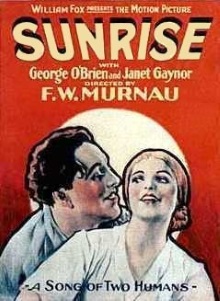
Every time you see a truly old film being covered in this blog, you’d know that it must be because it’s one of the all time greats. This is especially true for Sunrise by German expressionist director F.W. Murnau which is usually considered as one of the top ten greatest films of all time. It also stars the extremely tiny Janet Gaynor who we’ve seen before in Street Angel.
As in so many of the earliest silent films, the characters are deliberately left nameless to better accentuate that they are meant to be the everyman. The man and his wife live on a farm which hasn’t been doing so well recently. A woman from the city arrives and seduces the man, eventually convincing him to murder his wife and sell the farm so that they can go live together in the city. He plans to take his wife on a day trip across the water in his boat and drown her on the way but is plagued by guilt. When she finally realizes his intentions, she is horrified and begs for mercy. This being the angelic Janet Gaynor, we know that she can’t die so early in the film and so the man finds himself unable to follow through. The woman flees into the city and the man follows.
The film is highly stylized and is very much a morality play peopled by archetypes rather than rounded characters. As such the story is highly predictable and it’s impossible to actually identify much with the individual characters. Yet this doesn’t mean that the film is ineffective. Murnau obviously meant this as a sort of capsule showcase of the full range of human emotions and it’s really quite remarkable how well he succeeds at it. The tone of the film shifts abruptly between lust, love, hate, fear and even playfulness and humor as the relationship between the man and his wife play out according to the age old pattern. Even as we’re conscious of what the director is going for, we can’t help but be swept along by the perfectly paced set pieces, the expressiveness of the actors and the musical score. I was impressed by how the film manages to capture the essence of at least one of the basic stories of humanity that recur over and over again.
The film is superb both visually and technically. There’s one shot as the man and the wife arrive at the city in which we see pedestrians, a horse-drawn carriage, multiple motorcars and a tram all on the same busy street, a near perfect summary of the transition from the rural to the urban in one image. I found the idea of a tram line that goes through the woods and into the city that I tried to look up which city this was shot in and was somewhat disappointed that the whole film was shot on enormous sets specially constructed for it. That actually makes it more understandable how they could make huge gusts of wind sweep across the city streets and how they could film a scene of their tiny boat being tossed around in the mother of all storms. Other special effects including superimposing film to create a ghostly version of the woman from the city as a sort of evil temptress, the better to reinforce the sense that this is a morality play.
Still, Sunrise is so stylized and so completely predictable that I doubt it can emotionally move modern audiences. It’s more like a literal representation of the ideal film, something that can embody the essence of what a film is, and as such is a film that is more admired in the abstract. I think that’s why this is now considered a masterpiece.